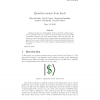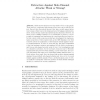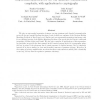19 search results - page 2 / 4 » Two-Source Extractors Secure against Quantum Adversaries |
CORR
2010
Springer
13 years 3 months ago
2010
Springer
Quantum money is a cryptographic protocol in which a mint can produce a quantum state, no one else can copy the state, and anyone (with a quantum computer) can verify that the sta...
CRYPTO
2009
Springer
13 years 11 months ago
2009
Springer
We consider two-party quantum protocols starting with a transmission of some random BB84 qubits followed by classical messages. We show a general “compiler” improving the secur...
CHES
2011
Springer
12 years 4 months ago
2011
Springer
Randomness extractors are important tools in cryptography. Their goal is to compress a high-entropy source into a more uniform output. Beyond their theoretical interest, they have ...
STOC
2007
ACM
14 years 5 months ago
2007
ACM
We give an exponential separation between one-way quantum and classical communication protocols for two partial Boolean functions, both of which are variants of the Boolean Hidden...
CORR
2008
Springer
13 years 5 months ago
2008
Springer
We consider the problem of building robust fuzzy extractors, which allow two parties holding similar random variables W, W to agree on a secret key R in the presence of an active ...



